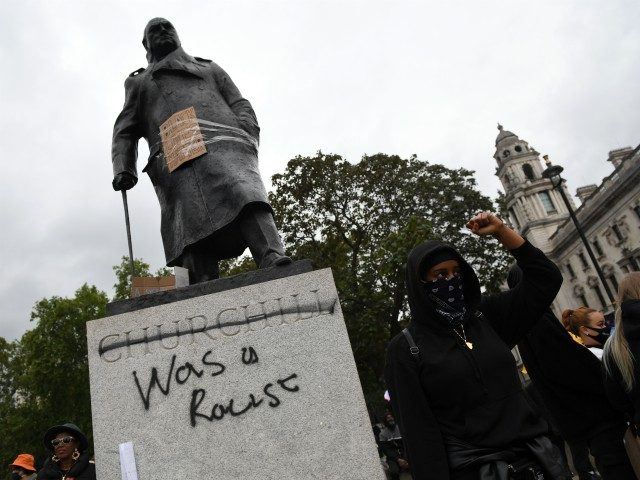The statue honouring Sir Winston Churchill and Britain’s national war memorial were included in a secret list of “contentious statues” by London’s Metropolitan Police in the wake of the Black Lives Matter movement, a report has revealed.
A report from the Policy Exchange think tank, which drew on freedom of information requests, has found that in response to radical protest movements such as the resurgence of the Black Lives Matter movement in 2020, Scotland Yard has compiled a list of public monuments and statues deemed to be “contentious” and therefore possible flashpoints for violence and vandalism.
Among the monuments was the statue of British wartime leader Sir Winston Churchill which stands in Parliament Square. The unearthed secret police report said that Churchill’s statue was included due to his support of the British Empire.
The police report also went on to cite questionably historic accounts often put forward by leftist academics as evidence of his supposed racism, such as the claim that he orchestrated the 1943-44 Bengal famine, despite evidence pointing to the wartime leader sending food to the region but was limited by realities of the Second World War.
The claim that Churchill was responsible for the deaths of millions of Indians has also been disputed by Nobel Prize-winning economist Amartya Sen, who is considered one of the world’s most esteemed experts on the topic of famine in India. Nevertheless, the statue has become a frequent target of vandalism by leftist radicals in the British capital.
Alongside Churchill in the police report was the “contentious” Cenotaph which was constructed to honour the “Glorious Dead” in the wake of the First World War and has since become the site of ceremonies memorialising fallen British and Commonwealth soldiers of all ethnic backgrounds in all conflicts involving the United Kingdom. Yet, it has dubiously been tied to imperialism, slavery, and racism and BLM activists have attempted to deface the monument, including an attempt to burn its flags, on multiple occasions.
As a result of them being supposedly “contentious”, the Met has on occasion erected barriers around the monuments, including controversially entombing Churchill’s statue in a metal box.
Commenting on the report, the grandson of Sir Winston, Nicholas Soames told the Daily Mail: “Certainly insofar as the Cenotaph is concerned, one could hardly believe that would be targeted by the protesters, and in terms of the Churchill statue, obviously I deeply regret it if people feel they want to protest there, but that matters less than the memorial to Britain’s war dead.
“But we now live in this world where nothing is held as valuable, which is very sad.”
The head of the Common Sense Group of Tory MPs, Sir John Hayes said that while he was sympathetic to the need of police to draw up a list of “contentious” sites, he added: “They [protesters] have no regard for our country’s proud history and no comprehension of the leadership displayed by the likes of Churchill.”
Tory MP Nigel Mills was less sympathetic towards the police list, saying: “It is fair enough if they have got a plan where these idiots are going to strike, but they should not be labelling them contentious – they are national heroes.”
The Policy Exchange report, entitled Tarnished Jewel, called for stricter policing around the areas surrounding Parliament as well as for the Westminster City Council to implement a public space protection order to prevent anti-social behaviour in the area, citing police data which showed that violent crime has risen over three times faster in Westminster compared to London as a whole.
It went on to argue in favour of the “Broken windows” theory of policing that was implemented to great success under former New York City Mayor Rudy Guiliani, in which a heavy emphasis is placed on small crimes in order to prevent areas falling into degeneracy and therefore stopping more serious crimes from occurring.
“[The] ‘Broken windows’ theory says that visible signs of vandalism, anti-social behaviour and neglect encourage further crime and disorder. It appears to hold true amid the literally broken windows of Westminster,” the report stated.
Former aid to Boris Johnson and author of the report, Andrew Gilligan said: “Nowhere else in Europe, with the possible exception of the Eiffel Tower, is more famous, or more emblematic of its nation. Yet what should be a showpiece has declined into a degree of squalor and disorder.”
The Met Police said their report was merely “highlighting for policing purposes those which were considered contentious by individuals and groups who may have sought to damage them’.
Follow Kurt Zindulka on Twitter here @KurtZindulka

COMMENTS
Please let us know if you're having issues with commenting.